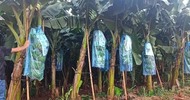Africa's untapped agriculture potential make it an ideal partner for resource-constrained Middle Eastern countries that seek to improve their food security, a new report from Standard Chartered Bank said.
- Trade Arabia
-
22 July 2010
"We support continued efforts to develop principles for investment in the agricultural sector undertaken by the World Bank, regional development banks, FAO, UNCTAD, and IFAD," say G8 heads of state.
- Canadian Press
-
26 June 2010
Evidence suggests a marked disparity in the benefits received by those involved in and affected by these transnational land acquisitions, particularly for those originally dwelling on the land.
- Brookings Institution
-
25 June 2010
A tribe of hunter gatherers living in trees in the forests of Papua, near the planned Merauke food estate where Wilmar and other firms plan to get farmland, has been discovered officially for the first time.
SilverStreet is scouting for commercial farms in five countries — Malawi, Mozambique, Tanzania, Uganda and Zambia.
- Institutional Investor
-
04 June 2010
Vaughan-Smith and his team of seven professionals are scouting for commercial farms in five countries — Malawi, Mozambique, Tanzania, Uganda and Zambia — where conditions are deemed to be the most favorable.
- Institutional Investor
-
28 May 2010
"Local businessmen make deals with foreign investors and convince tribal authorities in the area to give them land, but the water from the river is not just for people to take," says Water Affairs Under Secretary A. Nehemia who had not been informed about the farm.
Farms of foreign owners control more than 6 percent of the total Czech farmland area of 3.6 million hectares, weekly Euro says in its latest issue to be published on Monday, referring to data of the Czech Statistical Office
Saudi Arabian Agriculture Minister Fahd Bin Abdul-rahman Bin Sulaiman Balghunaim said at the summit that Saudi Arabia was planning to invest in Algeria's agriculture, like Egypt and Sudan.
GCC countries are doing the right thing by increasingly exploring investments in farmlands abroad, says Jasim Ali, Bahraini MP.
"Here’s what I’m sure of: these deals will make the rich richer and the poor poorer, creating clear winners who benefit while the losers are denied their livelihoods."
- Oakland Institute
-
26 April 2010
Korean investors are nervous about trusting African governments’ guarantees, and about complex and frequently arbitrary regulations.
- Joong Ang Daily
-
16 April 2010
The Cambodian government’s moves to allocate vast tracts of land to foreign and local companies are often done without consulting local villagers.
The Indonesian government's plan to develop a food estate in Papua has come in for heavy criticism for potentially marginalizing small farmers and threatening the environment.
"EAC Partner States should resist the leasing or selling of large chunks of land to foreign entities for production of food or bio-fuel feedstock solely for export, which will be disadvantageous to food security in the region" says the East African Legislative Assembly
- East African Community
-
24 February 2010
While the proposed deal brings up ethical questions of exploitation, another concern is how it will impact earth changes and food security in the future.
- MediaGlobal
-
04 February 2010
This three years memorandum is not only setting a framework of cooperation but it includes some specific steps such as mutual beneficial arrangements in the agricultural sector (e.g. investment and provision of grain, development of a grain terminal)
- Emirates News Agency
-
20 January 2010
The list of Indian companies that have purchased land in Africa is quite long and includes companies in businesses ranging from agriculture and horticulture to engineering and metals.
- Economic Times
-
02 January 2010
Militant farmers belonging to the Kilusang Magbubukid ng Pilipinas (KMP) are completely disgusted by the failure of government to stop land and crop conversions.
- Manila Bulletin
-
24 December 2009
There’s a whole school of economic thought that says that Collier is wrong, that big is not necessarily better in agriculture — and that the land deals therefore might be unwise not because they’re wrong but because they’re unprofitable.
- New York Times
-
19 November 2009
Buenos Aires-based Cresud plans to acquire more land to add to the 484,000 hectares (1.2 million acres) it owns and the 90,410 hectares it leases in Argentina, Brazil, Paraguay and Bolivia
- Bloomberg
-
09 November 2009
Stephen Murphy, managing director of institutional fundraising, said the firm had eyed agriculture and infrastructure investments in Uganda.
Roots for Equity Director Dr Azra Sayeed demanded that the Pakistani government stop giving agricultural land on lease to foreign food companies, and rather that these lands should be given to local growers to overcome food crisis in the country.
The UPA Government has deprived job opportunities to millions of illiterate and semi-literate Indians by forcing Indian companies to invest abroad in overseas plantations and coal mining sectors.
- Organiser
-
13 October 2009
Foreigners have an interest (partial or total ownership) in 1.6 percent of all privately held US agricultural land, a 1.4 million acre increase from 2007.
- Delta Farm Press
-
09 October 2009
A significant percentage of the manual labour force on arable land in Pakistan is female. If we lease this land to Saudi Arabia -- a country where women are not allowed to drive cars, vote, work in public places with a namehram -- to do with as it pleases -- will there still, across the proposed acreage reportedly twice the size of Hong Kong, be room for them?
Last May, while Pakistan’s military was waging its offensive in Swat, Islamabad officials were simultaneously launching another offensive in the Gulf: a charm offensive to secure investment in Pakistani farmland.
Tanzania has offered to lease land to Indian private companies for a period of 99 years, as it pitched for increased investment in the agricultural sector.
The terms of farmland deals are hardly made public. Although a theoretical possibility exists in a few cases for some transfer of technology for agricultural development, risk also exists to peasant farmers who cannot compete with well-resourced commercial farms. Take, for instance, the case of barley and oilseeds producers in Ethiopia.
- Abugida Info
-
13 August 2009
According to Steve Yuzpe, the CFO of Sprott Resource, ongoing population growth, dwindling arable land, water issues, even the falling yield productivity delivered by genetically modified seeds will be the big drivers for continued record demand—pushing food prices ever higher.
- Canadian Business
-
12 August 2009














